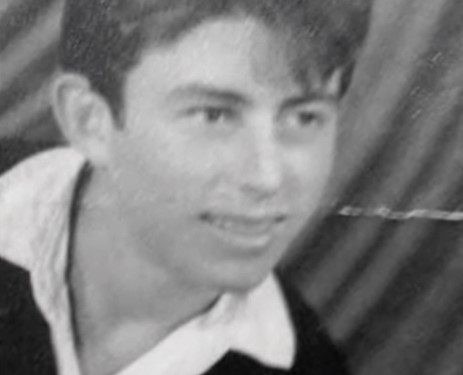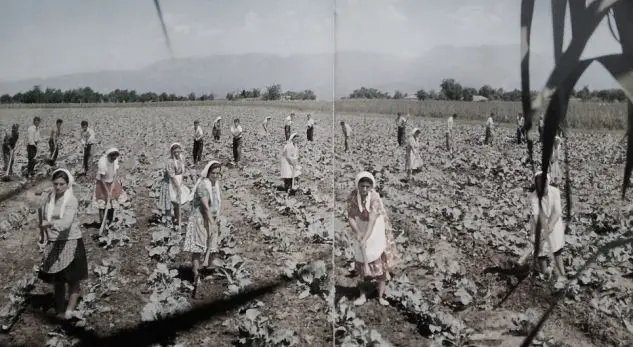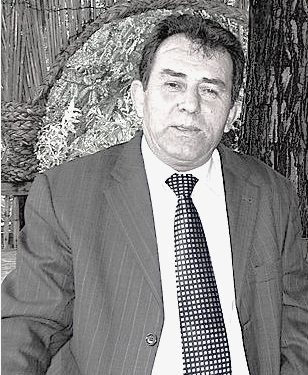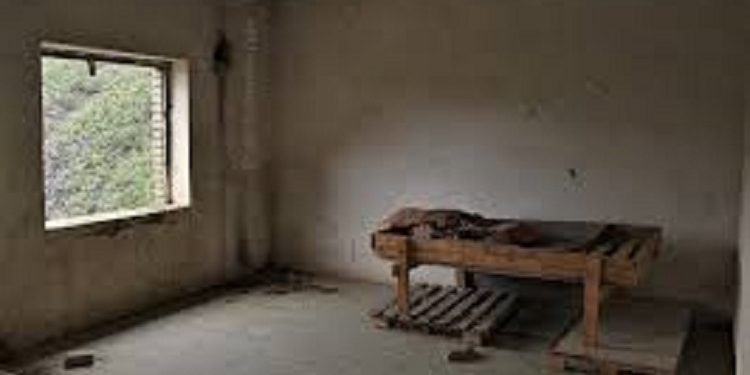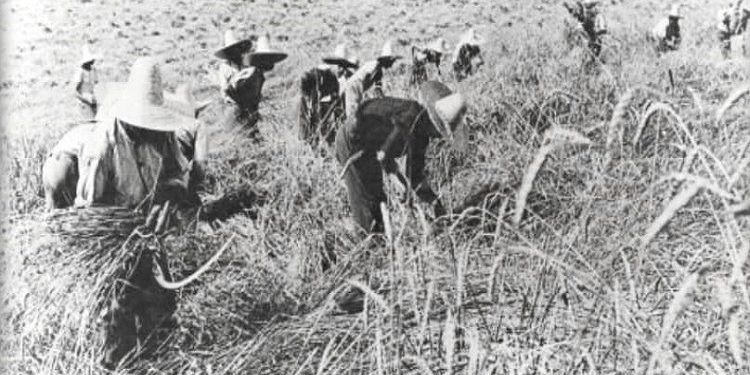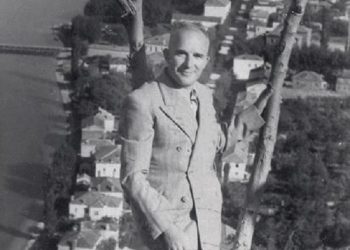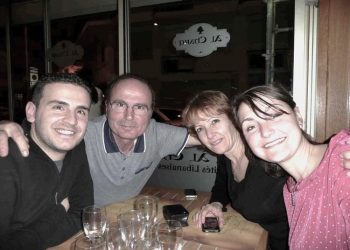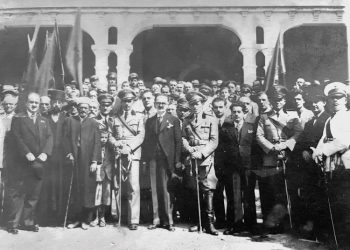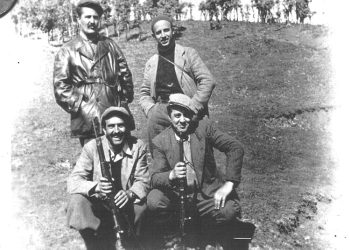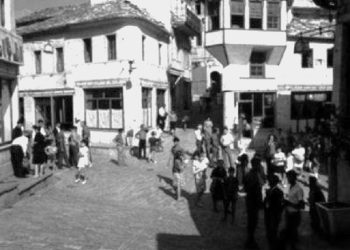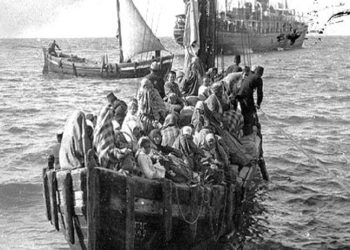By Shkëlqim ABAZI
Part twenty
SPAÇI
The Grave of the Living
Tirana, 2018
(My own memories and those of others)
Memorie.al / Now in old age, I feel obliged to tell my truth, as I lived it. To speak about the modest men who never boasted of their deeds and about others whose mouths the regime sealed and buried them in nameless pits. In no case do I assume the monopoly of truth or pretend to the laurels for an event where I was accidentally present, although I strove with all my soul to help my friends somewhat, who tactfully and kindly avoided me: “Brother, open your eyes… don’t get involved… you only have two months and a little left!” A worry that clung to me like an amulet from the morning of May 21, 22, and 23, 1974, and even followed me in the following months until I was released. Nevertheless, everything I saw and heard those three days, I would not want to take to the grave.
Continues from the previous issue
The Narrator’s Search and the Niece’s Fear
For the first time, I heard open talk on this topic. I had been under surveillance all my life. Hearing the protagonist’s conjectures was unique. I tried to find Ali’s relatives. I contacted a villager of his. He recommended a niece married in Uznovë. I met her and told her who I was. She did not welcome me. She implied that only her maiden surname and neighborhood connected her to Ali Hoxhallari.
The fellow villager insisted: “I don’t know what she told you. She is his brother’s daughter. She caused the fight with Zejnullah’s daughter. That led to her uncle’s arrest and conviction.” “Maybe you’re wrong,” I said. “She admitted the neighborhood connection, but denied any blood tie.” “What are you saying? Do you know him, or do I? We grew up in the same village!” “That’s what she said!” “Oh my God, what cowards! The fever of fear has them. They deny even their relative!” “She denied any connection.” “Shall we go together?” “Agreed.”
We went the next day. Workers gathered in a crowd near the hangars. They were discussing politics. One was shouting the future would be better. Another interrupted, saying they would starve. They claimed beys and aghas, now back in power, were splitting the farms. My companion went inside. After two minutes, he returned with a woman wearing a headscarf. I recognized the woman from the first day. When she saw me, she turned bright red. Perhaps the stranger’s presence terrified her.
“Why did you deny Uncle Ali, you leech?” the fellow villager shouted. “I have children, Selo!” she replied, eyes wide. “This is a friend of your uncle, you idiot!” “I don’t remember my uncle, much less his friends!” “Don’t you realize communism has failed, you blockhead?!” “Please, Selo, you’ll ruin us!” she begged, almost crying. “I apologize! Don’t be scared. Times have changed,” I intervened. “No one protects us, brother! They will take our lives!” “They have certainly sown fear. But be proud of your uncle. He defied the system bravely. He deserves honor today.” “Where will we find him to honor him? His name and shadow are lost!” she burst into tears.
As she tried to stop sobbing, her shoulders shook. She kept turning her head toward the hangars. “Why are you afraid?” I asked. “My brother-in-law is here!” “Call him. What’s the problem?” “The brigadier will find out!” “Big deal, then what?” the villager jumped in. “You are taking the bread from my children, Selo!” “You are still afraid? Do you know who this is?” He pointed at me. “No!” “He is the Chief of Cadres of the Internal Affairs Branch, you coward!”
She froze. Maybe she couldn’t believe her ears. “Leave me alone, brother Selo. Don’t mock me!” “Why, did we come to mock you? He is the real thing, you leech!” The shadow of communist police was terrifying. The blue uniform deeply impressed the political convict’s niece. A policeman then could terrify you. A Chief of Cadres could ruin your life. Just hearing their names was frightening. Dealing with them was unimaginable.
From beneath her headscarf, she lifted tearful, wide eyes. They showed fear, panic, terror, questions, and hope. She stared at me with disbelief. “Sister, it’s true!” I interrupted. “Things have changed in recent months. The police and the Chief of Cadres are no longer untouchable. The bosses who wrote biographies are gone. In democracy, we only do personnel policy.” She froze with her head up. Her face became deathly pale. Her legs gave way. She collapsed onto a fig stump. “Is this true?” she asked, wide-eyed. “Certainly!”
The workers saw their colleague crying. They approached but didn’t understand. Two young men knew me from the election campaign. They addressed me: “Chief, what good brought you here?” “I had a meeting with this lady!” “With her? She is a comrade, honored one!” “Why do you judge her poorly?” “She is with the communists!” “I don’t believe that. She is the niece of my prison friend! Repeat that, I didn’t hear it?” I strained my neck. “It is completely true!” “Oh God, how hard we worked to convince her to vote for us!” “I voted for the Democratic Party!” the woman snapped from the stump. “No, not you, no!” “I swear on my children’s lives!” she vowed. “You gave us a hard time, you crazy woman!” “What could I do? I was afraid!” “Of whom, dear?” “Of the brigadier!” She looked around, startled. “Of that spy, you?!” He followed with a vulgar curse. “Calm down, we will meet later,” I concluded. I shook her hand and left. After five steps, we heard: “Selo, oh Selo!” A middle-aged man approached and they spoke. When he returned, he told me that in the afternoon, we would meet Ali’s brother and the niece’s husband.
Meeting Muharrem
At the set time, I took a table. Opposite me sat an old man I knew from internment. A younger man was with him. When Sela arrived, he asked the clients across the room: “Why are you sitting there?” “We have a meeting!” the younger man replied. “With whom?” “With a friend!” the older man said. “Do you know him?” “No!” “This is the friend!” “What?! This one with you!?” “Yes!” “Really this one!?” “I tell you, this one!” “What, what, this one!?” Sela burst out laughing. The other two replied with amazement. I couldn’t believe my eyes. I had worked with Muharrem for two years. I never knew he might be connected to Ali. He bore the surname Hoxha. He posed as a war veteran. Everyone feared him. They thought he was an informer. I feared him more than others. For years, he served in the horse and ox stables. He ate, slept, and stayed there. He went to the village once or twice a month. He was gossiped about for vices, especially regarding honor. He had close ties with the brigadier and the operative. This forced me to keep my distance. I couldn’t imagine his behavior. Maybe he lived a double life. Many anonymous people did under that regime. But being a partisan seemed enough reason for me to stay distant.
Double Life
Oh God, what a personality change under socialism! Character was ruined. Mentality was warped. The individual lived a dual life. He laughed when he should cry. He cried when he should laugh. He thought one thing and said another. The homo-amorphous was born. The ‘Shiva’ hybrid, half-man and half-woman. A robot with a controlled mechanism instead of a brain. A cruel heart circulated lymph, not blood. L’uomo nuovo was created. A clockwork mechanism instead of a brain. The chameleon-slave with a hundred skins. The anthropophagic vampire with forked teeth. The hydra ready to tear apart his kin for the Party. He was ready to drink his own child’s blood!
To hide from conscience, they invented a carnival appearance. They put on masks to fool the public. Leninizm conceived and installed the mask regime! Mask and mask, and mask everywhere…! One mask for the road, one for work, one for meetings, one for the cafe. One for school, one for the stadium, one for the cinema, one for the theater. One for acquaintances, one for strangers. At the end of the day, returning home, they threw them aside. They put on the ugliest one, the family mask. The home mask was the most repulsive. You had to whisper even inside your dwelling. God forbid a secret was overheard by the children. They might expose you publicly.
In bed, where you hoped for truth, you had to control your orgasms. You had to dominate your dreams. Woe if a bourgeois ghost appeared. It would be punished like waking fantasies. Nowhere did anyone dare show their real face. Maybe in the coffin! But only after expressing happiness to die. You had to leave the Party strong! Even the afterlife was thus punished…! Masks were created. Mask and mask, and mask everywhere…! You had to deny others and yourself.
Propaganda promised a golden spoon. It promised a bright future. The class struggle raged unrestrained. It kept creating enemies in the village, city, workplaces, schools, military units, and even the family cell. A rampant hatred, enviable even by cannibals, spread through the masses. They eliminated the Fathers of the Nation. They got rid of the intellectual elite, patriots of independence, education, and Europeanization. They suppressed and replaced traditional literature and folklore. This was replaced by Bolshevik rags of socialist realism (the lie). Makarenko’s didacticism became social rubbish. It led to collective intoxication.
The anthropophagic bandits sang to the murderers: “Traitors like mice are condemned by Bedri Spahiu…!” “Enemies to the grave, traitors to the gallows! Let’s drink their blood! Let’s take revenge! Let’s hang them! Let’s kill them! Let’s cut them! Let’s shit on them!” “Hurrah-a-a-a!” These cheers named the era. Collective chaos began.
The foundation of education became the members of the Political Bureau. These were the buffoons of the Central Committee of the Party of Labor of Albania. They grinned on posters across the homeland’s facades. They left their wives and children. They wanted beautiful, educated, and especially Party-loyal young women. The monkeys imitated them. They cursed their family and kin. Mother, father, sister, brother were denounced. This was because they did not side with communists in the war. They chose the other barricade.
Genetics was ruined. A “communist” blood group was born. Following these faithless models, they were ready to cut every tie to their family. Name, surname, race, clan, relatives, far and near. They were even ready to change their blood. “I will do dialysis!” the delirious shouted in ideological mania. “What is your suffering?” the doctor asked. “Class epilepsy!” “You caught it, you must get rid of it!” the pragmatists advised. “We want new blood!” the delirious insisted. “What blood, you wretches?” the parents worried. “The Party’s blood!” The maniacs threw away their parents’ pictures. They kissed the “Number One.”
The laggards declared themselves permanent volunteers. They joined every youth action. This was to “cleanse” their biography. They wore scarves with the faces of two shameless figures. One was a feminine boy with a pickaxe. The other was a masculine woman with a rifle. They worked three times as hard. Their goal was to fill their chest with large and small SSS’s (medals). After the month ended, they extended their stay by one, two, or three months. “I will stay until we finish this project!” the laggard proclaimed. “Maybe we should build another railway!” a similar one interjected. “Where to, man?” “To Sazan. And then another from Sazan to Durrës!” “But isn’t there sea there?” “What sea can resist drying and what mountain resists cleaving by our eagle-eyed Party!” “Long live the Party!” “Party, the whole world!” “Hurrah-a-a-a! Party-Enver, we are ready anytime…”
“Why don’t we build one to the moon too!” the biggest laggard proposed. “To the moon?!” “Why not!” “Well said! Why didn’t we think of that before?” “Where will we lay the tracks?” a skeptic wondered. “The Party and Comrade Enver know!” the blood-crazed one snapped. “May Comrade Enver live as long as the mountains?” “Hurrah-a-a-a! Party-Enver, we are ready anytime…” “Why, man, should the American imperialists step there before us?!” the first one argued. “Hang the bag on the deceivers! They surely won’t step there!” “Only triumphant Marxism-Leninism can conquer the globe and the galaxies for an ideal!” “Glory to Marx, Engels, Lenin, Stalin!” “And to Enver!” “Enver above all others! He fights the enemies of communism tooth and nail!” “He is the guiding light of the world proletariat!” “Oh, what fate we have!” “Lucky we are that Enver was born here!” “Welcome Enver boy, we have missed you,” the boys chanted. “May he take days from my life?” “And from mine!” “How would things have been if he hadn’t been born? Or if he had been born in America?!” “Shh-t, shut your mouth! Only this land gives birth to lions!” “I heard about one in China, too…?” “The world has two lions: one Asia, one Europe…” “Ehh-u-u, the Chinese one is great, but ours is a giant.” “Hurrah-a-a-a! Party-Enver, we are ready anytime!”
“Father, I hate you!” the prodigal son cursed. “I love you, my son!” the father replied. “Why did you give birth to me as a kulak?” the damnation accused. “Others made us so; I was born rich!” “Mother, why did you conceive me with father?” he turned to his mother. “With whom should I have conceived you, my son?” “With the Party, dear!” “Where was the Party then?” “Don’t you know the bureau secretary?” “Hodon, man!” “Yes, dear!” “He was two years old when I gave birth to you!” “You should have conceived me with him! He knew how to give birth to communists!” “He was a gendarme, my son!” “It just seemed that way to you. He was disguised on a Party mission!” “I didn’t know. When I conceive a second time, I will keep that in mind!”
The vagrants fled desperately. They wanted to lose all traces: village, city, neighborhood, alley, house, clan, brotherhood. Handsome boys arranged marriages with communists’ daughters. This was to stay in the region of their military service. “Let her be whatever she may be: a complete slut, blind, disabled, quiet, bad-looking. Just to escape the war,” they urged. They drove the simpletons without knowing them! Ready to commit any madness for the survival of their future children, they married women to escape the mud and corn bread. They chose the city’s brazen lowlife or a corrupt, syphilitic, and venereal woman. The condition was proximity to power. This secured a comfortable life for the groom. /Memorie.al




